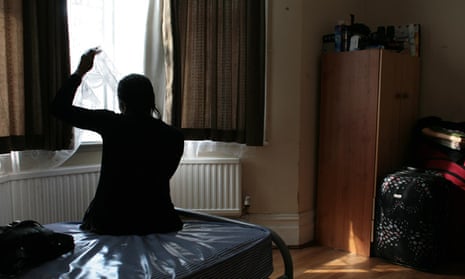Under the guise of improving laws against trafficking, states around the country are pushing policies that raise penalties for patronizing prostitution. This January, Human Trafficking Awareness Month, it’s time we faced the facts that these efforts will ultimately fail to protect trafficking victims.
First, let’s consider the complex definition of human trafficking. Human trafficking is a scheme where a perpetrator compels another to work against her will through force, fraud or coercion.
Who is a trafficker? A trafficker is someone who creates a climate of fear intended to intimidate and control a worker. They can exist in any industry, particularly where the trafficker can exploit certain vulnerabilities of the worker, such as limited education, scant knowledge of legal rights, age, limited English proficiency, reduced immigration status or limited awareness of resources for assistance.
Who is a trafficking survivor? An adult who is forced, defrauded, or coerced to work in someone’s home as a domestic worker is a victim of human trafficking. A child who is forced, defrauded, or coerced into picking tomatoes on a farm is a victim of human trafficking. Or a person who is forced, defrauded, or coerced into engaging in commercial sex is a victim of human trafficking.
Misguided policies that focus exclusively on the commercial sex industry ignore the large number of victims and survivors who are trafficked into construction, agriculture, factories, restaurants, the hospitality industry, domestic work and other fields. Enhancing the penalties on prostitution laws fails to address the victim who is trapped in a nail salon or the survivor who escaped from a state fair.
In most states, there are already laws against prostitution. To shoehorn trafficking into this framework ignores the crucial elements of force, fraud and coercion. For example, a person whose car is used for prostitution is not a trafficker. Criminalizing those involved in prostitution where there is no force, fraud, or coercion, or where no minors are involved, may prevent people from identifying and reporting trafficking as a crime or assisting in investigations.
Within the commercial sex industry, policies must recognize the unique circumstances of the trafficking survivor. Because trafficking victims are often forced to commit various crimes under coercive circumstances, states should protect survivors from criminal prosecution by allowing them to assert an affirmative defense in prostitution prosecutions if they can show they engaged in prostitution as a result of human trafficking.
States should also pass policies that ban condoms from being used as evidence in prostitution-related crimes, including human trafficking. In order to maintain control, traffickers often forbid victims from carrying or using condoms, putting victims at risk of unwanted pregnancy or sexually transmitted diseases.
However, effective anti-trafficking policies must go beyond increasing penalties for prostitution. One step in the right direction is California’s recently enacted supply chains law, which requires businesses be more responsible about eradicating human trafficking and forced labor from their supply chains. It would also cause customers to be more conscientious as they shop.
Laws that impact survivors, not perpetrators, are truly the most effective approach. In addition to their legal needs, survivors require multiple social services. A trafficked sheepherder may need counseling and employment assistance, while a person trafficked into prostitution may need medical assistance and housing. Many trafficking survivors also want or need economic justice and try to seek restitution or file civil actions against their traffickers. Policies that provide for access to critical services, funding for experienced anti-trafficking agencies, and a private right of action are all crucial to prioritizing the rights and needs of survivors, and protecting them on their road to recovery.
